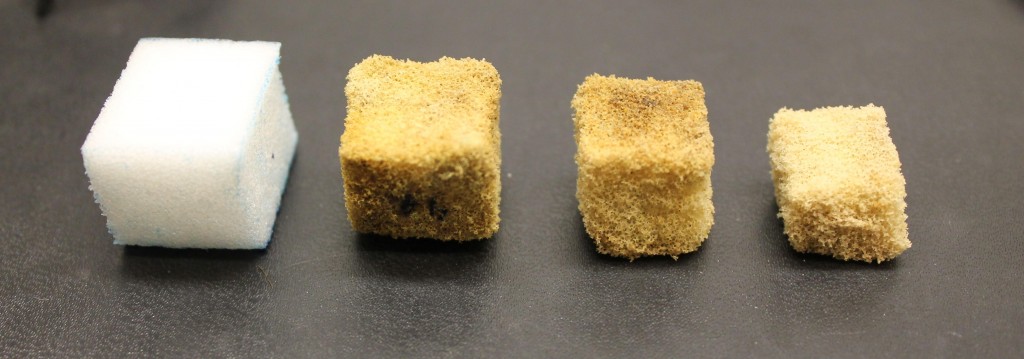
Algenesis announced today that their Soleic™ 52F bio-foam has proven to biodegrade in the natural environment and the results have been published in a Peer-Reviewed Science Paper.
As we continue to learn how widespread and harmful plastic pollution has become for our planet, scientists at Algenesis and UC San Diego have been collaborating to develop a sustainable solution to the growing problem of plastic pollution.
The recent study, published this week in Bioresource Technology Reports, highlights our team’s first success in creating a commercially deployable, fully biodegradable polyurethane product.
“The paper shows that we can develop commercial-quality foams that biodegrade in the natural environment,” said Stephen Mayfield—CEO of Algenesis and the senior author on the paper “After hundreds of formulations, we finally achieved one that met commercial specifications. These foams are 52 percent bio content—eventually, we’ll get to 100 percent bio content.”
This publication is just one in a list of analyses and testing that has been done, both internally, with the help of UCSD, and through third party, to validate this breakthrough technology. Additional certifications and validations can be found on our website.
Algenesis’ underlying core technology is a high quality, biodegradable polyurethane foam system with applications in a wide variety of markets. The technology is branded Soleic™ which means “sun oil”. The development of this Soleic™ 52F formulation took years of trial and error. The process involved rebuilding and rethinking formulation practices that have been around for decades, using new, novel monomers that were not direct drop-in replacements for petroleum monomers.
The research and development resulted in a new ‘matrix’ of formulation knowledge which can be applied to future products across multiple industries. Including building insulations, foam cushioning in shoes, bedding, and automobiles, surfboards, skateboard wheels, and many other products that contain PU in some form. It is a market so extensive that it is expected to result in 12,000 Metric tons of plastic in landfills or the natural environment by 2050.
Through the partners we work with and the community we’re working to serve we see that there is a drive and an urgency to find a solution to plastic pollution. We’re not the only ones working on a solution, and we wouldn’t want it any other way. We are always happy to cheer on the successes of our competitors as quickly as our own, and today Algenesis is proud to announce what we see as a great step forward for the industry and our planet.
“People are coming around on ocean plastic pollution and starting to demand products that can address what has become an environmental disaster,” said Tom Cooke, President of Algenesis. “We happen to be at the right place at the right time.”
The authors include Natasha Gunawan, Michael Burkart, Robert “Skip” Pomeroy, Ariel Schreiman, Ryan Simkovsky, Anton Samoylov, and Troy Bemis of UC San Diego. From Algenesis the authors include Stephen Mayfield, Marissa Tessman, and Nitin Neelakantan.
The research was supported by grants from the Department of Energy Bioenergy Technologies Office (DE-SC0019986) and the National Science Foundation (1926937) to Algenesis Materials.
Source
Algenesis, press release, 2020-08-10.
Supplier
Algenesis Materials
DOE’s Bioenergy Technologies Office (BETO)
National Science Foundation (USA)
University of California, San Diego
Share
Renewable Carbon News – Daily Newsletter
Subscribe to our daily email newsletter – the world's leading newsletter on renewable materials and chemicals










